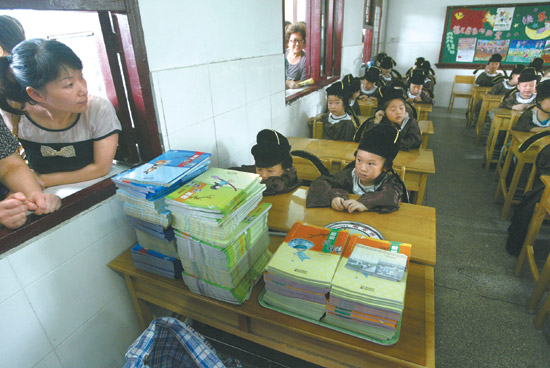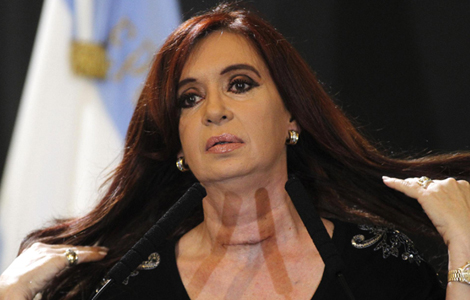Battle of words over the future of poetry
Updated: 2012-01-27 11:05
By Zhang Yuchen (China Daily)
|
|||||||||||
 |
|
Newly enrolled first-graders at a Nanjing primary school start their first class at the city's Confucius Temple. Children are encouraged to learn more about traditional Chinese culture, which may help produce more poets in the future. [Duo Duo / For China Daily] |
Since the early 1990s, poets who had previously expressed no interest in making money found themselves caught up in China's "gold rush". They headed south in their droves to pursue a much better life of materialism.
Bai Ya, from Anhui, was one of those who stopped writing poetry in the 1990s and joined the exodus to Guangdong, the most economically active province in China at that time, to work.
He spent seven years working in public relations without writing another poem. Even top poets gave it up for a couple of years.
"As far as I know, anyone in the 1990s who carried on writing or reading poetry were teachers," said Bai.
"In such a populous country, it would only take a niche audience to re-ignite the development of poetry, so it's a pity that such reader groups have not yet formed," he was quoted by Xinhua News Agency as saying.
Publishing houses have now lost interest in poetry, said Fan Xi'an, general manager of Sanlian Bookstore in Beijing, "In recent years, there have been no poetry collections that have become bestsellers. For a publishing house in China, if a book sells less than 5,000 copies, it loses money. The payoff for these 5,000 books to the poet is only 7,500 yuan. ($1,190)"
However, with the new millennium came a growth in social reflection propelled by the relatively new medium of the Internet.
"We always suffer under the illusion that young people read and write less poetry but it is not true," said Wang Xiuyun, editor of Beijing Literature. "Many young people from different backgrounds write good poetry. We just don't know them because there is less communication between the two generations."
Many young poets believe it is the best time for China's modern poetry. "Thanks to the Internet, now students can write their poetry online and paste the verses on different platforms: BBS (bulletin board systems), forums or pure literature websites," said Yu Huaiyu, the founder of Poetry Paper website, one of the three largest poetry websites, which handles more than 1,000 discussion threads every day online.
Hundreds of thousands of literature-relevant websites have transformed the landscape and given new blood to the medium, say devotees.
Poetry Paper has more than 10,000 active members from home and abroad.
"It is an era of thriving online poetry for ordinary people," said Yu, speaking about the website he established 10 years ago. "Poets freely share with each other online."
The people writing on the website are divided equally among those born in the 1960s and 1970s, those born in the 1980s and those born in the 1990s.
Modern poetry pioneer Bei Dao said in an interview with Xinhua that the young generation of readers who grew up in the era of commercialization could not escape the impact of the times.
Nowadays young poets or young people trying to write poetry focus on the pragmatic issues of daily life, among them the great pressures from living an urban life, the high cost of buying a home, and romantic issues.
"Before, poets cared more about social responsibility. Of course, it should have been their concern, but we can see more how much they cared now young people center on their own lives and spirit," said Xu Demin, who founded Fudan Poets Society in 1981.
"Poetry is more like a pipe transmitting various emotions in today's society," said Wang Chenlong, 24, former president of the student poets society at Minzu University of China, Beijing. "In many society members' minds our society has already been playing a role like other kinds of societies, such as animation groups or skateboard clubs. In their eyes, there is no difference."
During the worst period of Wang's presidency, only five undergraduates, including one from the law school, were members of the society. At the time, about 100 undergraduates and postgraduates were majoring in Chinese literature on campus.
"It is OK by me," said the poetry fan, who is preparing for the entrance examination for this year's Chinese modern literature postgraduate study. "Reading and writing poetry, as always, interests only a few."
Every six months, Wang seeks to collect poetry from his friends or fellow students to publish and share.
Although Wang said most of his friends stopped reading and writing poetry as soon as they left university, he and other young poets believe now is the best time for real poet writing from the heart.
"With huge change and new social problems arising, I think young poets can draw on more material for their work," he said.
Many believe that because the poets have no market, they cannot sell themselves. The corollary to this is that if they go on writing poetry, they can devote themselves to true literature. In this respect a young poet can master the demands that any future potentially excellent work puts upon him or her.
"(Good modern Chinese poetry) might exist," said Wolfgang Kubin. "I would be glad if someone would one day say to me, 'See, this young man or woman writes great poetry'."
There are many who hope he is right.
Mei Jia contributed to this report. Contact the reporter at zhangyuchen@chinadaily.com.cn
Hot Topics
Kim Jong-il, Mengniu, train crash probe, Vaclav Havel, New Year, coast guard death, Internet security, Mekong River, Strait of Hormuz, economic work conference
Editor's Picks

|

|

|

|

|

|







